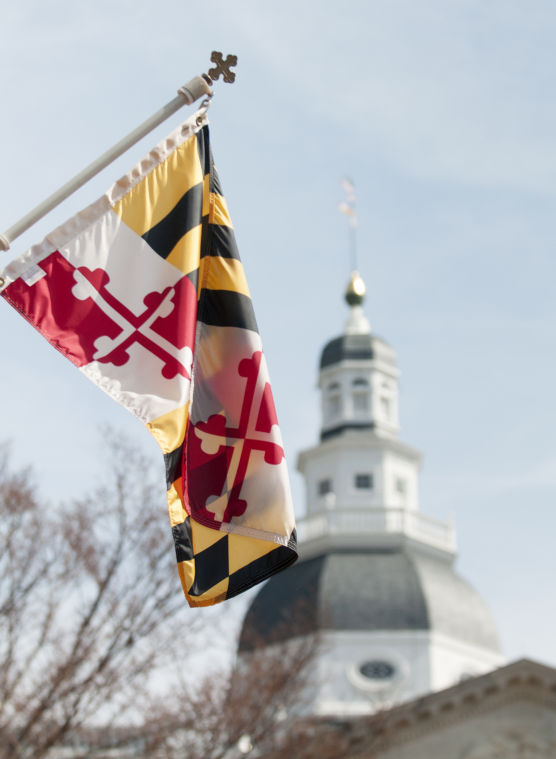
A Maryland flag outside the State House in Annapolis.
ANNAPOLIS — Bills that once seemed unlikely or far-reaching found their way to Gov. Martin O’Malley’s desk this year. Lawmakers this session were able to pass a repeal of the death penalty, enact stricter gun control laws and establish a long-term wind energy project off the coast of Ocean City.
There was newfound support for bills that seemed dead on arrival year in and year out. But that doesn’t mean lawmakers don’t have their work cut out for them next year — several measures have been shelved until the next legislative session, including transgender anti-discrimination, recreational marijuana legalization and eliminating legislative scholarships.
Transgender anti-discrimination
The LGBT community secured a crucial victory last year when same-sex marriage narrowly passed the General Assembly. But advocates are worried after a Senate committee killed a transgender anti-discrimination bill.
The legislation would prohibit transgender discrimination in housing, applying for credit and public accommodations. Transgender individuals already have difficulty finding housing, supporters said, and without legal protections, it’s only more challenging.
A similar bill introduced in 2011 passed the House of Delegates but never got to the Senate floor for a vote. This year, Sen. Richard Madaleno (D-Montgomery) introduced it in the Senate in the hopes that it would clear its most daunting hurdle before going to the House. However, it remained stuck in the committee process.
“Unfortunately, there is enough fear and ignorance that it scared people away,” Madaleno said.
The bill’s use of the phrase “public accommodations” has tripped lawmakers up in the past, he said.
“I think, for the most part, people don’t understand public accommodations are theaters, restaurants, hotels,” Madaleno said. “There’s this sense of public accommodations are bathrooms and locker rooms, and I think there’s confusion among many as to what that would mean in terms of gender identity.”
Madaleno plans to sponsor and introduce the bill again next year — it’s not going away anytime soon, he said.
Recreational marijuana legalization
The General Assembly authorized marijuana for medical purposes on the last day of the legislative session, but the debate rages on over legalizing recreational use after both Washington state and Colorado legalized it in November.
As expected, even by the lawmakers who sponsored such a bill, it died in committee. If passed, the measure would legalize and tax the drug — but it may still be a while before the political consensus in Annapolis is more receptive to such a measure.
“I support that 100 percent,” Del. Cheryl Glenn (D-Baltimore City) told The Diamondback in February. “I would love to have full legalization, but we know the difficulties with getting that done because of what we’ve been going through with the medical marijuana.”
But just passing medical marijuana is a victory in itself. It was a year ago when O’Malley pledged to veto any medical marijuana bill if it crossed his desk for fear that federal regulators would step in and shut down state dispensaries. Many said such fears were unfounded.
This year, O’Malley’s lack of outright opposition could be a positive sign for marijuana bills in the future and may send the state down the path to recreational legalization.
“It’s good to start the conversation,” Glenn said, adding that she’s “sure it will happen” in the future.
Eliminating legislative scholarships
In what has become a perennial attempt to undo the General Assembly’s scholarship program, a measure that would eliminate legislative scholarships once again never left committee for a floor vote.
The bill would take a long-standing state program that allows lawmakers to dole out scholarship money to constituents, providing few guidelines as to how that money should be distributed. Instead, the measure proposes turning that money over to the Office of Student Financial Assistance in the Maryland Higher Education Commission.
“From my point of view, I don’t know what qualifies a legislator to be any better determining who should get a scholarship than someone from the Higher Education Commission,” Sen. Allan Kittleman (R-Carroll and Howard) said in an interview with The Diamondback in January.
Supporters of the bill have said the current program gives legislators too much power and could be used to unfairly woo voters and curry favor with constituents. The new measure would largely take those politics out of the scholarship and put it in the hands of a third-party organization.
Kittleman said he isn’t explicitly aware of any lawmakers doling out questionable scholarships, but the broad criteria in the law doesn’t help assuage fears that it could happen.
“People could give scholarships to their best friend’s daughter, they could give scholarships to their biggest contributor’s son, they could give scholarships for any possible reason,” Kittleman said. “The only criteria is they live in your district.”
Opponents, however, said the measure is a misguided attempt at “good government,” targeting a program that isn’t as fraught with government corruption as some might think.
“I’ve never seen any example of that, nor am I expecting any example of that,” Del. Doyle Niemann (D-Prince George’s) said in a January interview with The Diamondback.
Last year, Illinois passed a measure that eliminated its state-sponsored legislative scholarship program.



